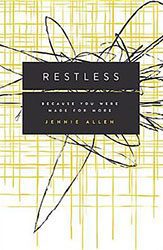Jennie Allen’s Restless: Because You Were Made For More (2013, W Publishing Group, $15.99) begins with the assumption that there is within all humans an inherent desire to live a fulfilling and purposeful life. However, Allen has recognized as well that for many Christians, the activities and goals they thought would complete them have only satisfied for a season, leaving an uncomfortable restlessness behind—a dull sense that surely there is more to life than this, but no clear awareness of how to muster the power to revive old dreams or the bravery to dream new ones.
Drawing on her own experience as a “stay-at-home mom” whose restlessness led to recognizing God’s call on her life to the time-consuming and challenging ministry of writing, speaking, and leading, Allen encourages her readers to focus more directly on the source of their restlessness: God’s cry for greater submission to Him and greater action in line with His will for our lives. The life of purpose and contentment—Allen writes—is one where our wills and actions are completely aligned with God’s.
Perhaps the most important challenge Allen works her readers through though is the one of how—once one has committed to surrendering one’s will to God—to determine what God’s will looks like. With this relationship as the starting point, Allen encourages readers to examine a variety of “threads” in their lives that will help indicate where God might use them: What are our gifts? Who are the people who depend on us? What suffering do we see around us? What passions do we have? And where are the places we regularly find ourselves where we might make a difference? The answers to these questions will be unique for every person, and Allen argues that no calling that unraveling these threads will reveal is too small, that we can serve God from anywhere in any capacity, from our living rooms and local grocery stores to the ends of the globe. As long as we are doing what God has called us to do, the fruits will be plentiful, and we will find rest in our purpose.
What makes Restless an especially compelling and unique discussion of God’s will is Allen’s willingness to deal with what we will likely experience as consequences or challenges when overhauling our lives:
- The guilt of changing our commitments in a way that might shake up the routine of a family
- The challenge of resisting cultural expectations (for women, for mothers, for professionals, for pastor’s wives, etc.) on the way to answering God’s call
- The temptation to compare what God is doing in the lives of others with the purpose he has laid on our hearts.
For me personally as a reader, Allen’s examination of what “finding God’s will” looks like was invaluable. The practice of relinquishing an obsession with having a clear “big picture” view of our lives at all times in exchange for step by step—in every action, word, and thought—choosing to follow God’s teachings was revolutionary for me. She makes it clear that this process will be both one of confidence in what we do know is God’s will and faith that what we don’t know will be revealed in time. She writes that she “shudder[s] to think how accidental we all believe life is” and that though “there may not be complete clarity,…if your heart is willing and you want God’s glory, and you give him these pieces of your life, something will happen” (126, 169).
The urgency she places on this task is also equally inspiring. She reminds her readers repeatedly of the brevity of life and the significance of doing God’s work now while we have the opportunity. The notion that even the smallest of our submissions to His will—choosing to speak unselfishly, give more graciously, think more purely, share the Gospel more boldly—has great relevance to His work is not only penetrating scriptural truth but an incredible motivator for getting serious about this work now. She reiterates that it is through us that God can lead others to Him and challenges us to recognize and act on this need, wherever we are:
“Next time you are in a public space, be awkward and look in people’s eyes. People—nearly every one of them—are hurting, even if they don’t say it. And we hold their cure. We get to give God away, and it is for our joy.” (136)
I cannot imagine a reader coming away from Restless without a deeper understanding of what God desires from us, of how special we are, of how unique the purposes for our individual lives, and of how incredible it is that God wants to use this uniqueness—the dreams and gifts and loves that characterize us—to multiply His fruits on earth and our joy in life. Allen’s bravery in calling us out of our restlessness, gently but assertively leading us to truth, and motivating us to act is invaluable. This book will cause you to think, change your approach to life, and draw you closer to God. What more could a reader ask for? I am blessed to have had Restless cross my path.
Read an excerpt from Restless at the Book Club here!
 Amber M. Stamper holds a Ph.D. in English (Rhetoric and Composition) and is an Assistant Professor of Language, Literature, and Communication at Elizabeth City State University in North Carolina. Her research and publications center on religious rhetoric and communication, especially issues of Christian evangelism and the digital church.
Amber M. Stamper holds a Ph.D. in English (Rhetoric and Composition) and is an Assistant Professor of Language, Literature, and Communication at Elizabeth City State University in North Carolina. Her research and publications center on religious rhetoric and communication, especially issues of Christian evangelism and the digital church.














